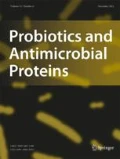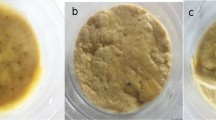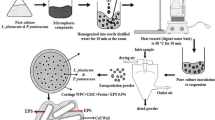Abstract
The present study investigated skimmed milk and alginate-based encapsulation for protection of a probiotic strain, Lactobacillus gastricus BTM7 during storage and exposure to simulated gastrointestinal conditions. The investigations have revealed that coating with skimmed milk and alginate in a ratio of 1:1 resulted in highest encapsulation efficiency of 94% (p < 0.05) with approximately 1 log reduction in viable cell count and 90% release of encapsulated cells in 90 min. This formulation resulted in 5-fold higher survival of bacteria during storage at refrigeration for 21 days (p < 0.05). The encapsulation of L. gastricus BTM7 provided better protection at the pH of gastric juice or pancreatic conditions with 4- and 9-fold increase in survivability after 2 h of incubation. The principal component analysis (PCA) revealed the potential of skimmed milk supplementation to alginate (1:1) to enhance survival of probiotic strain under refrigerated storage, a process that can be safely incorporated into dairy products.


Similar content being viewed by others
References
Masood MI, Qadir MI, Shirazi JH, Khan IU (2011) Beneficial effects of lactic acid bacteria on human beings. Crit Rev Microbiol 37:91–98
Shah NP (2007) Functional cultures and health benefits. Int Dairy J 17:1262–1277
Sánchez B, Delgado S, Blanco-Míguez A, Lourenço A, Gueimonde M, Margolles A (2017) Probiotics, gut microbiota, and their influence on host health and disease. Mol Nutr Food Res 61:1. https://doi.org/10.1002/mnfr.201600240
La Fata G, Weber P, Mohajeri M (2018) Probiotics and the gut immune system: indirect regulation. Probiotics Antimicro Proteins 10:11–21. https://doi.org/10.1007/s12602-017-9322-6
Kareb O, Aïder M (2018) Whey and Its Derivatives for Probiotics, Prebiotics, Synbiotics, and Functional Foods: a Critical Review. Probiotics Antimicro Prot 1–22. https://doi.org/10.1007/s12602-018-9427-6
Prasanna PH, Charalampopoulos D (2018) Encapsulation of Bifidobacterium longum in alginate-dairy matrices and survival in simulated gastrointestinal conditions, refrigeration, cow milk and goat milk. Food Biosci 21:72–79
Liu L, Li X, Zhu Y, Bora AFM, Zhao Y, Du L, Li D, Bi W (2016) Effect of microencapsulation with Maillard reaction products of whey proteins and isomaltooligosaccharide on the survival of Lactobacillus rhamnosus. LWT Food Sci Technol 73:37–43
Fritzen-Freire CB, Prudêncio ES, Amboni RDMC, Pinto SS, Negrão-Murakami AN, Murakami FS (2012) Microencapsulation of bifidobacteria by spray drying in the presence of prebiotics. Food Res Int 45:306–312
Anand S, Beniwal A, Singh KS, Aggarwal D (2018) Significance of probiotic encapsulation and deficiencies within. The Pharma Innov J 7:434–439
Dias MI, Ferreira IC, Barreiro MF (2015) Microencapsulation of bioactives for food applications. Food Funct 6:1035–1052
Etchepare MA, da Silveira MF, de Menezes C, Barreto AR, Cavalheiro CP, de Menezes CR (2015) Microencapsulation of probiotics by extrusion method associated with electrostatic interactions. Ciênciae Natura 37:75–86
Mathews S (2017) Microencapsulation of probiotics by calcium alginate and gelatin and evaluation of its survival in simulated human gastro-intestinal condition. Int J Curr Microbiol App Sci 6:2080–2087
Yasmin I, Saeed M, Pasha I, Zia MA (2018) Development of whey protein concentrate-pectin-alginate based delivery system to improve survival of B. longum BL-05 in simulated gastrointestinal conditions. Probiotics Antimicrob Prot 1–14. https://doi.org/10.1007/s12602-018-9407-x
Cook MT, Saratoon T, Tzortzis G, Edwards A, Charalampopoulos D, Khutoryanskiy VV (2013) CLSM method for the dynamic observation of ph change within polymer matrices for oral delivery. Biomacromolecules 14:387–393
Pan LX, Fang XJ, Yu Z, Xin Y, Liu XY, Shi LE, Tang ZX (2013) Encapsulation in alginate–skim milk microspheres improves viability of Lactobacillus bulgaricus in stimulated gastrointestinal conditions. Int J Food Sci Nutr 64:380–384
Wang L, Yu X, Xu H, Aguilar ZP, Wei H (2016) Effect of skim milk coated inulin-alginate encapsulation beads on viability and gene expression of Lactobacillus plantarum during freeze-drying. LWT Food Sci Technol 68:8–13
Sharma L, Mahajan R, Attri S, Goel G (2017) Selection of indigenous Lactobacillus paracasei CD4 and Lactobacillus gastricus BTM 7 as probiotic: assessment of traits combined with principal component analysis. J Appl Microbiol 122:1310–1320
Bhatnagar M, Attri S, Sharma K, Goel G (2018) Lactobacillus paracasei CD4 as potential indigenous lactic cultures with antioxidative and ACE inhibitory activity in soymilk hydrolysate. J Food Measure Character 12:1005–1010
Choudhary S, Singh M, Sharma D, Attri S, Sharma K, Goel G (2018) Principal component analysis of stimulatory effect of synbiotic combination of indigenous probiotic and inulin on antioxidant activity of soymilk. Probiotics Antimicro Prot 1–7. https://doi.org/10.1007/s12602-018-9432-9
Sharma K, Pooranachithra M, Balamurugan K, Goel G (2018) Multivariate analysis of increase in life span of Caenorhabditis elegans through intestinal colonization by indigenous probiotic strains. Probiotics Antimicro Prot 1–9. https://doi.org/10.1007/s12602-018-9420-0
Attri S, Sharma K, Raigond P, Goel G (2018) Colonic fermentation of polyphenolics from sea buckthorn (Hippophae rhamnoides) berries: assessment of effects on microbial diversity by principal component analysis. Food Res Int 105:324–332
Rossier-Miranda FJ, Schroën K, Boom R (2010) Mechanical characterization and pH response of fibril-reinforced microcapsules prepared by layer-by-layer adsorption. Langmuir 26:19106–19113
Serna-Cock L, Torres-León C, Ayala-Aponte A (2015) Evaluation of food powders obtained from peels of mango (Mangifera indica) as sources of functional ingredients. Inform Tecnol 26:41–50
Livney YD (2010) Milk proteins as vehicles for bioactives. Curr Opin Colloid Interface Sci 15:73e83
Mandal S, Puniya AK, Singh K (2006) Effect of alginate concentrations on survival of microencapsulated Lactobacillus casei NCDC-298. Int Dairy J 16:1190–1195
Shi LE, Li ZH, Zhang ZL, Zhang TT, Yu WM, Zhou ML, Tang ZX (2013) Encapsulation of lactobacillus bulgaricus in carrageenan-locust bean gum coated milk microspheres with double layer structure. LWT Food Sci Technol 54:147–151
Iqbal R, Zahoor T, Huma N, Jamil A, Ünlü G (2018) In-vitro GIT tolerance of microencapsulated Bifidobacterium bifidum ATCC 35914 using polysaccharide-protein matrix. Probiotics Antimicrob Proteins 12:1–10
Krasaekoopt W, Bhandari B, Deeth H (2004) The influence of coating materials on some properties of alginate beads and survivability of microencapsulated probiotic bacteria. Int Dairy J 14:737–743
Corona-Hernandez RI, Álvarez-Parrilla E, Lizardi-Mendoza J, Islas-Rubio R, de la Rosa LA, Wall-Medrano A (2013) Structural stability and viability of microencapsulated probiotic bacteria: a review. Compr Rev Food Sci Food Saf https://doi.org/10.1111/1541-4337.12030, 12, 614, 628
Hsiao HC, Lian WC, Chou CC (2004) Effect of packaging conditions and temperature on viability of microencapsulated bifidobacteria during storage. J Sci Food Agric 84:134–139
Chuang JJ, Huang YY, Lo SH, Hsu TF, Huang WY, Huang SL, Linn YS (2017) Effects of pH on the shape of alginate particles and its release behavior. Int J Polym Sci 2017:1–9. https://doi.org/10.1155/2017/3902704
Gbassi GK, Vandamme T, Ennahar S, Marchioni E (2009) Microencapsulation of Lactobacillus plantarum spp in an alginate matrix coated with whey proteins. Int J Food Microbiol 129:103–105
Atia A, Gomaa A, Fernandez B, Subirade M, Fliss I (2018) Study and understanding behavior of alginate-inulin synbiotics beads for protection and delivery of antimicrobial-producing probiotics in colonic simulated conditions. Probiotics Antimicrob Proteins 10:157–167
Hansen LT, Allan-Wojtas P, Jin YL, Paulson AT (2002) Survival of Ca-alginate microencapsulated Bifidobacterium spp. in milk and simulated gastrointestinal conditions. Food Microbiol 19:35–45
Heidebach T, Först P, Kulozik U (2010) Influence of casein-based microencapsulation on freeze-drying and storage of probiotic cells. J Food Eng 98:309–316
Prasanna PH, Grandison AS, Charalampopoulos D (2014) Bifidobacteria in milk products: an overview of physiological and biochemical properties, exopolysaccharide production, selection criteria of milk products and health benefits. Food Res Int 55:247–262
Acknowledgements
The authors wish to thank Jaypee University of information Technology for providing essential facilities required for this research work.
Author information
Authors and Affiliations
Corresponding author
Ethics declarations
Conflict of Interest
The authors declare that they have no conflict of interest.
Electronic Supplementary Material
Table S1
(DOCX 16 kb)
Rights and permissions
About this article
Cite this article
Singh, M., Sharma, D., Chauhan, R. et al. Skimmed Milk-Based Encapsulation for Enhanced Stability and Viability of Lactobacillus gastricus BTM 7 Under Simulated Gastrointestinal Conditions. Probiotics & Antimicro. Prot. 11, 850–856 (2019). https://doi.org/10.1007/s12602-018-9472-1
Published:
Issue Date:
DOI: https://doi.org/10.1007/s12602-018-9472-1




